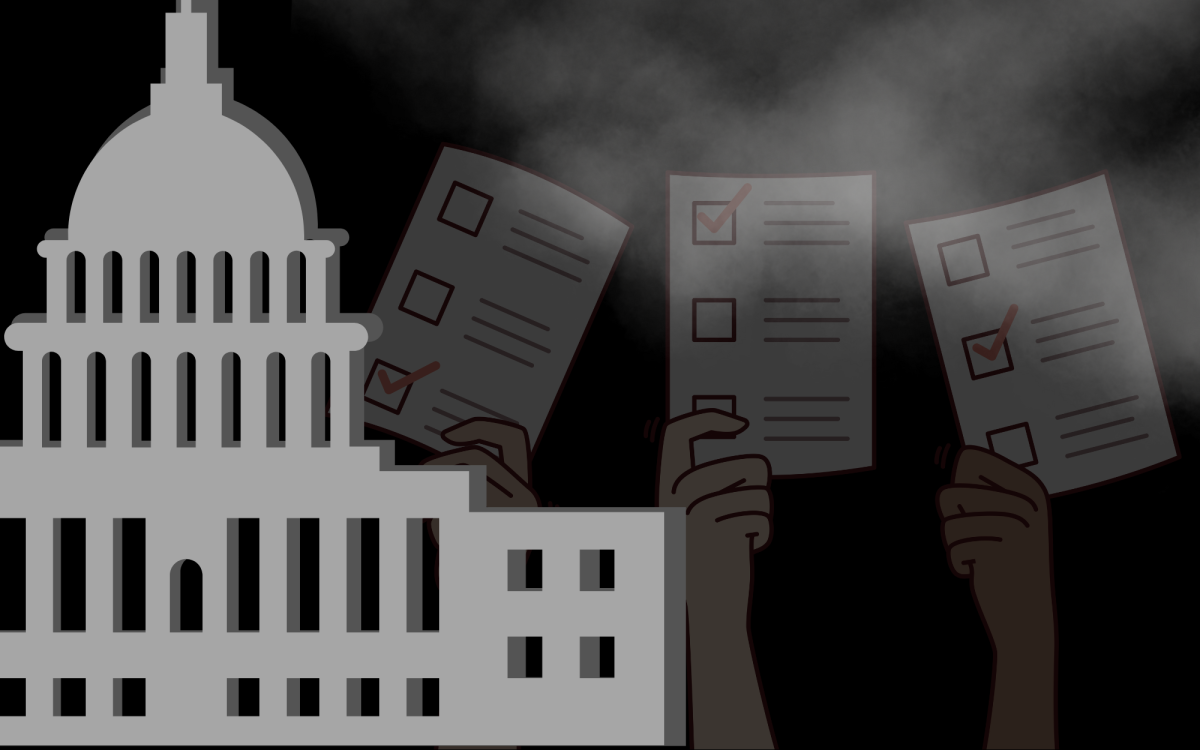The American government is run as a federal democratic republic. Essentially, that is a union of 50 sovereign states that govern themselves with representatives elected by the general public. Supposedly, the power to dictate how the country is run is within the American people. Since power is distributed in such a way, average American voices should be heard when deciding on a national leader. With flaws prevalent in the electoral process, the “people have the power” idea fails to flourish.
When the founding fathers developed America’s government, they urged Americans to make amendments to the constitution when the government they created failed to protect natural, unalienable rights. The founding fathers outlined these rights as being the rights to life, liberty and the pursuit of happiness. 10 amendments, known as the Bill of Rights, came as a package with the ratification of the constitution. The Bill of Rights further established the guidelines for the government — boundaries to not be crossed. Additionally, it informed citizens of basic privileges and liberties they had by merely existing in America. Limitations to the government’s power amplified the powers granted to the American people.
In addition to the Bill of Rights, seventeen more amendments have been added to the constitution over time. All changes, in one way or another, altered the daily lives of citizens for the better of democracy. In the 12th Amendment, a list of changes was made to the electoral college. Prior to these changes, the electoral college was a system where a number of representatives from each state, proportionate to the state’s population, voted on who became president. From there, the most popular candidate won the election. The second most popular candidate served as vice president to the elected winner.
On paper and in execution, the electoral college system was notably flawed. A government made “of the people, for the people and by the people” should grant much more power to the people than what was established. Changes to the electoral college were absolutely essential, and they were done, yet not in the means necessary to fulfill the federal promise of power to American individuals.
Instead of having a group of nominated representatives decide who would be president, the 12th Amendment gave individual states the same number of electors as the number of representatives they had in Congress. Electors did not have the privilege of nominating a particular candidate, unlike in the past. Each elector, under the 12th Amendment, was almost viewed as being a point value. States with a larger population density were given the upper hand because, by having more citizens in their territories to represent, they therefore had more representatives in Congress. It also gave them more electoral power.
The adaptation made in the 12th Amendment unfolded a new realm of inequity. It, in simple terms, stripped public-endorsed electors of the ability to nominate a particular presidential candidate and transformed their purpose to just being a point on the election board. Since its creation, the electoral college has contradicted the core values of the national government. As for the American people, the change to the electoral college further diminished the value of their individual voices. One vote, in the broad scheme of things, does not matter if it does not align with the views of the majority. It is drowned in generality.
“On the day of the general election, citizens aren’t casting a ballot for the presidential candidate directly, they are casting a vote for the electors who pledge to vote for a particular candidate,” Ms. Kelly Krawchyk, sophomore civics teacher, said.
The electoral college still generates issues in every presidential election. For instance, in the 2000 election, tensions were high between the two dominant candidates, Al Gore and George Bush, because the turnout depended solely on results from Florida. Even though Gore was leading in popular votes, which is the input of qualified voters opposed to those of elected officials, Bush secured Florida’s 25 electoral votes by only 500 ballots. A similar outcome happened in the 2016 election between Hillary Clinton and Donald Trump. Clinton won the popular vote with 65 million votes — 48.0%. Trump trailed behind her with 45.9%. He lost by three million votes to Clinton, and, yet, he still managed to win the race because he secured the states with more “points.”
To be a fair, thriving democratic republic, America needs to recognize the voices of every citizen, not just the broad majority. Through acknowledging the popular vote, true worth is instilled within every cast ballot. The president would then be elected by the people themselves rather than through an inequitable point-value system.The ability to fully acknowledge the popular vote would eliminate the electoral college entirely. That is an amendment that may be essential to amplifying America’s promise: people will have the power.
“I think our goal as a democracy should be to try to represent citizens’ voices as thoroughly as possible,” Krawchyk said. “If we have a government where the people have the power, shouldn’t we want our government to represent the people as accurately as possible?”



